Tweed Valley Pioneers
Henry Skinner settled on the banks of the Tweed River in 1863, establishing a cedar-getting business that laid the groundwork for a century of entrepreneurial ventures. His family (21 children) expanded into sugar cane farming and, in 1880, launched an aerated soda and cordial business. By 1888, they had built a thriving riverboat transportation service, established with a mail contract and expanded to moving goods and passengers throughout the region. The Skinner family’s pioneering efforts made significant contributions to the development of the Tweed Valley, helping transform it into a bustling regional hub during the 20th century.
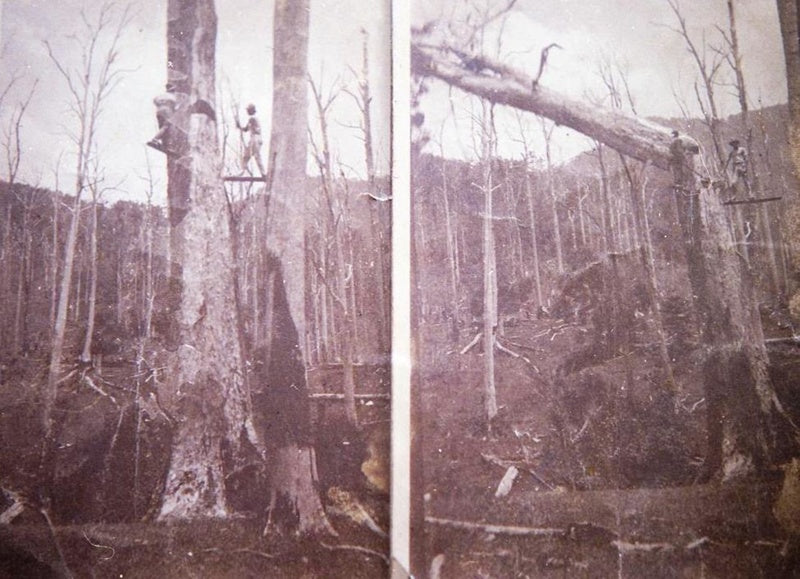
Timber Getting
Henry Skinner arrived in the Tweed Valley in 1863, drawn by the promise of opportunity in the booming timber industry.
Contracted by Samuel William Gray and Joshua Bray, Henry set out to harvest cedar, known as "red gold," from the dense forests along the Tweed River.
His initial work in timber-getting was grueling and dangerous, requiring both skill and resilience to fell and transport the massive cedar logs.
He established a saw mill near the old tumbulgum cemetery to provide materials to build houses in the area in 1873 with the purchase of Inglewood.
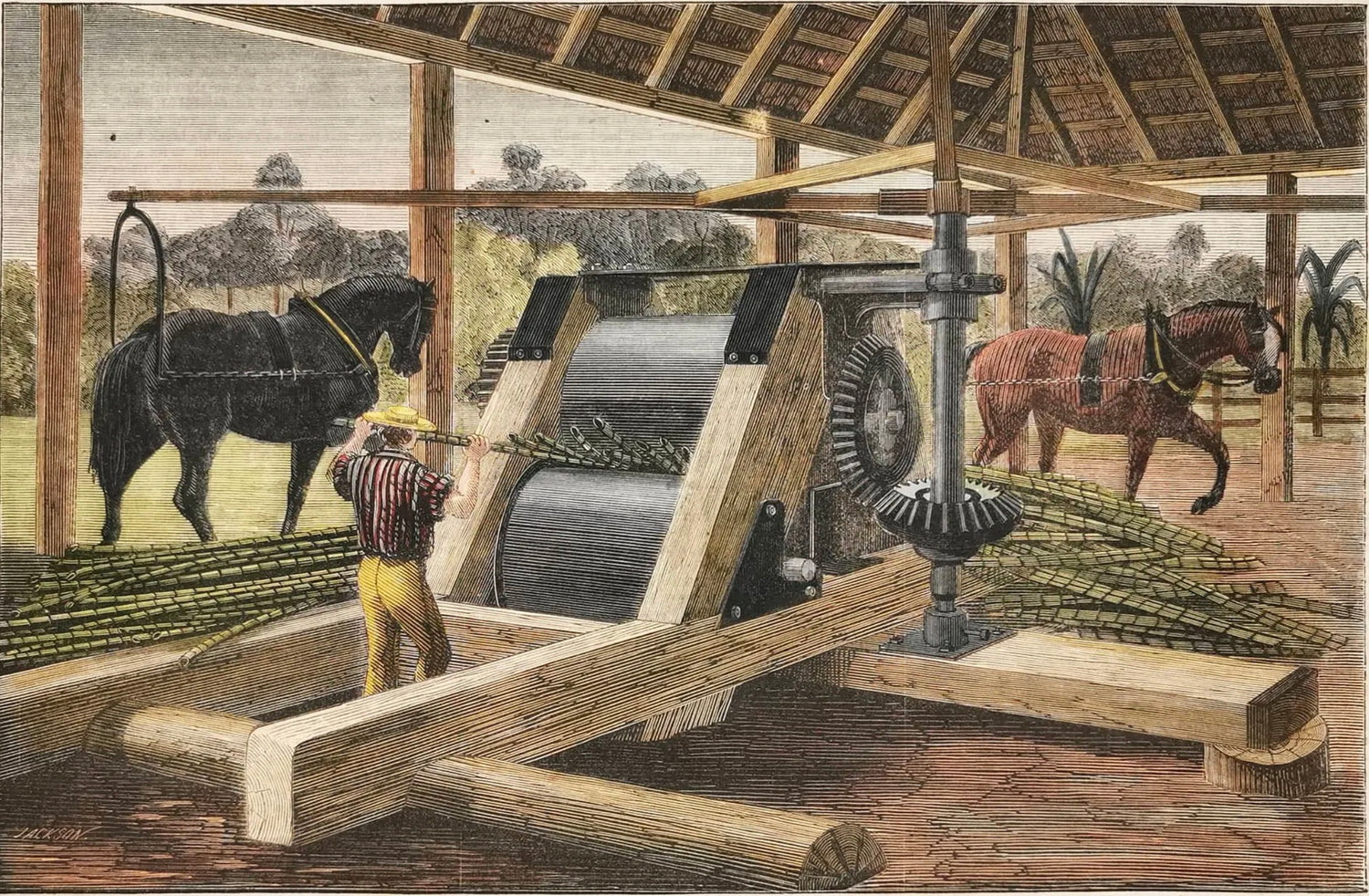
Sugar Cane
Henry Skinner diversified his business interests by purchasing land on the corner of the Rouse and Tweed Rivers. Here he established one of the first processing plants for sugar cane in the area.
The property known as “Inglewood” near North Tumbulgum. Here, he established one of the area's earliest sugar mills around 1875, using a horse-powered system to crush cane from his own farm and that of neighboring farmers.
The mill, later known as the Inglewood Mill, operated until around 1885, helping to lay the foundation for the local sugar industry before larger centralized mills arrived.
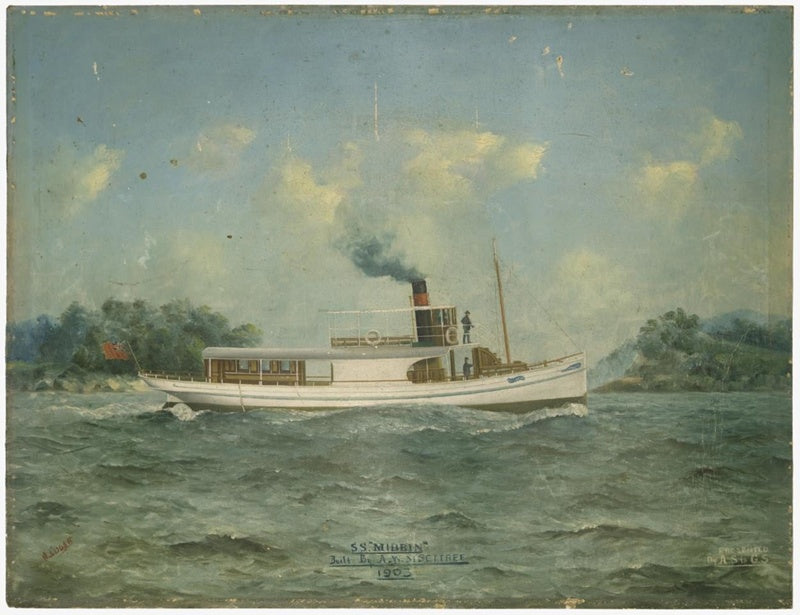
River Boats
The Skinner family's riverboat enterprise on the Tweed River began in the late 1800s with humble rowboats and a mail contract, eventually growing into a pivotal transport service for the region.
Starting with the delivery of mail and homemade cordials, the Skinners expanded their fleet to include steam-powered vessels, beginning with theS.S. Florriein 1888.
Over the years, they added several boats, including thePearl,Uki, andBooyong, connecting isolated communities to larger transport networks.
The Skinner boats became essential transportation links between Murwillumbah, Tweed Heads, and surrounding towns, facilitating trade, communication, and community growth.
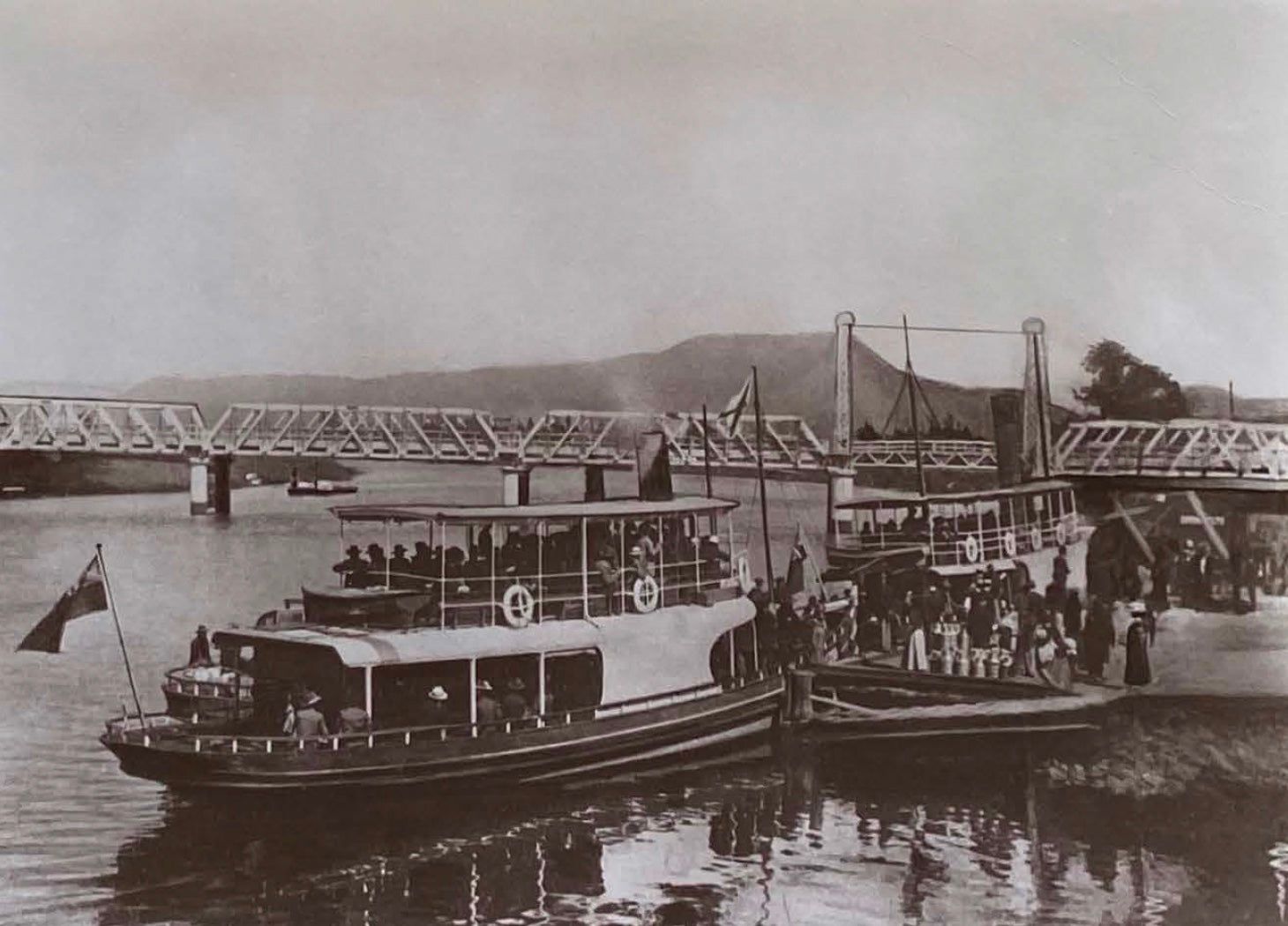
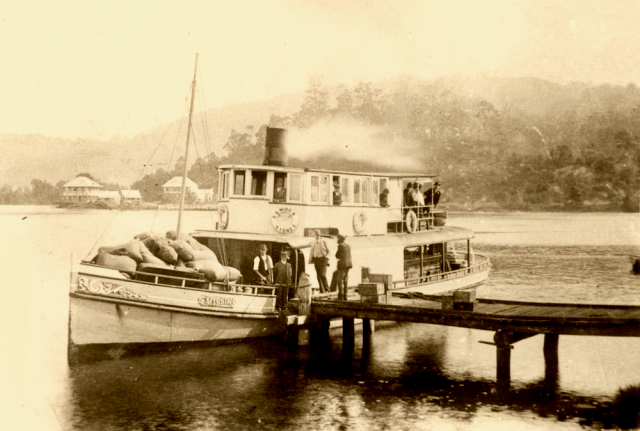
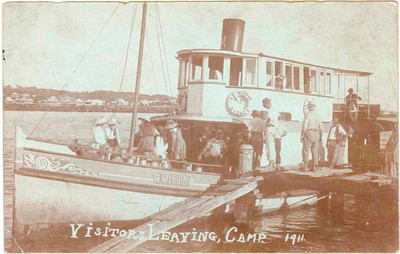
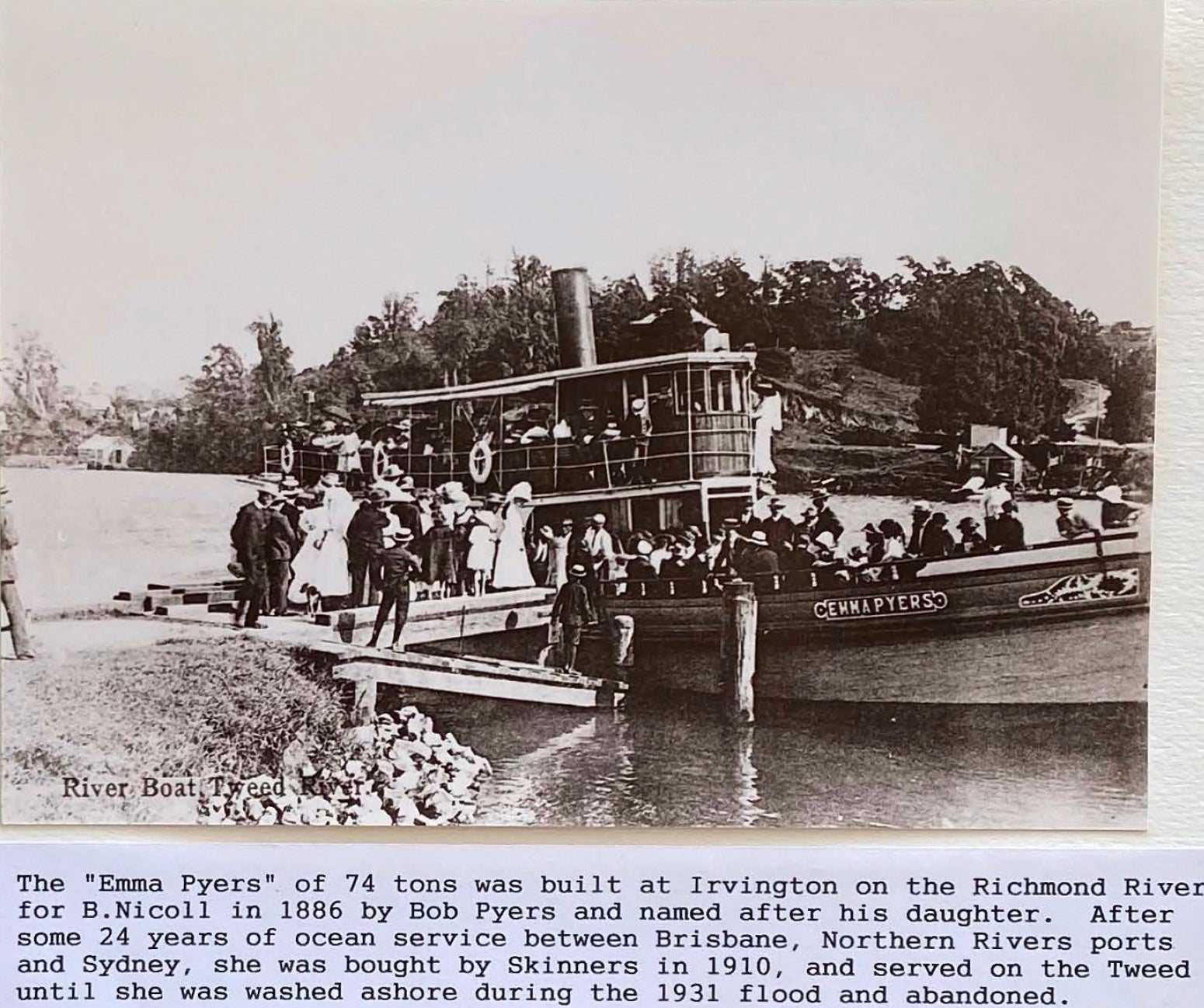
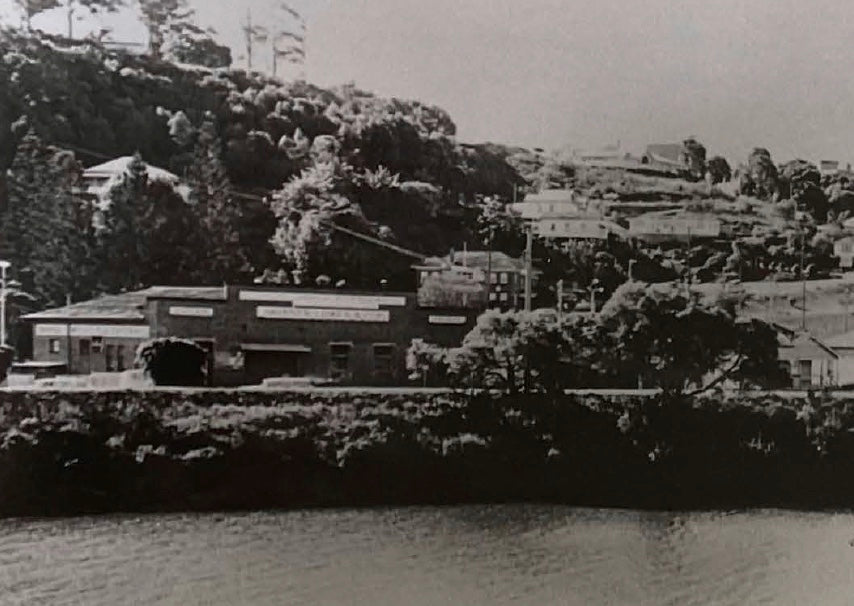
Cordial Enterprise
The Skinner family's cordial business began in 1880 when George Skinner, seeing an opportunity to add value to their homegrown sugar, traveled to Lismore to learn the art of cordial-making.
Returning with newfound expertise, he and his brother Chad set up a small factory on the family property at Inglewood, producing popular beverages like ginger beer and lemonade.
As demand grew, the Skinners expanded their operations, eventually relocating to Murwillumbah in the early 1900s and building a modern brick factory at Tumbulgum Road in 1925.
Skinner Family History in the Region
Henry Skinner was a savvy sawyer and timber-getter on the north arm of the Tweed, later farming at Tumbulgum. He arrived in the Tweed Valley following the negotiation of a lucrative contract with one of the largest land owners in the area "Samuel Gray" for 20,000 super feet of timber suitable for boat and home building purposes. He started a horse drawn sugarmill on his North Tumbulgum property "Inglewood" in 1870, one of the earliest on the Tweed. He then developed a value add business to the sugar mill by building a cordial factory at Inglewood with his sons George and Charles in 1880. The factory expanded and relocated to Murwillumbah where some years later a public company was formed, known as Skinner, Lowes, and Co., Ltd. In 1884 Skinner Bros, also secured the mail contract from Murwillumbah to Tweed Heads, the mail initially being carried by rowing boat. Later the firm secured a small steamer "Florie", and carried on a river passenger and cargo trade in addition to the mail contract. This fleet increased to ten vessels operating along the Tweed River for more than 50 years.
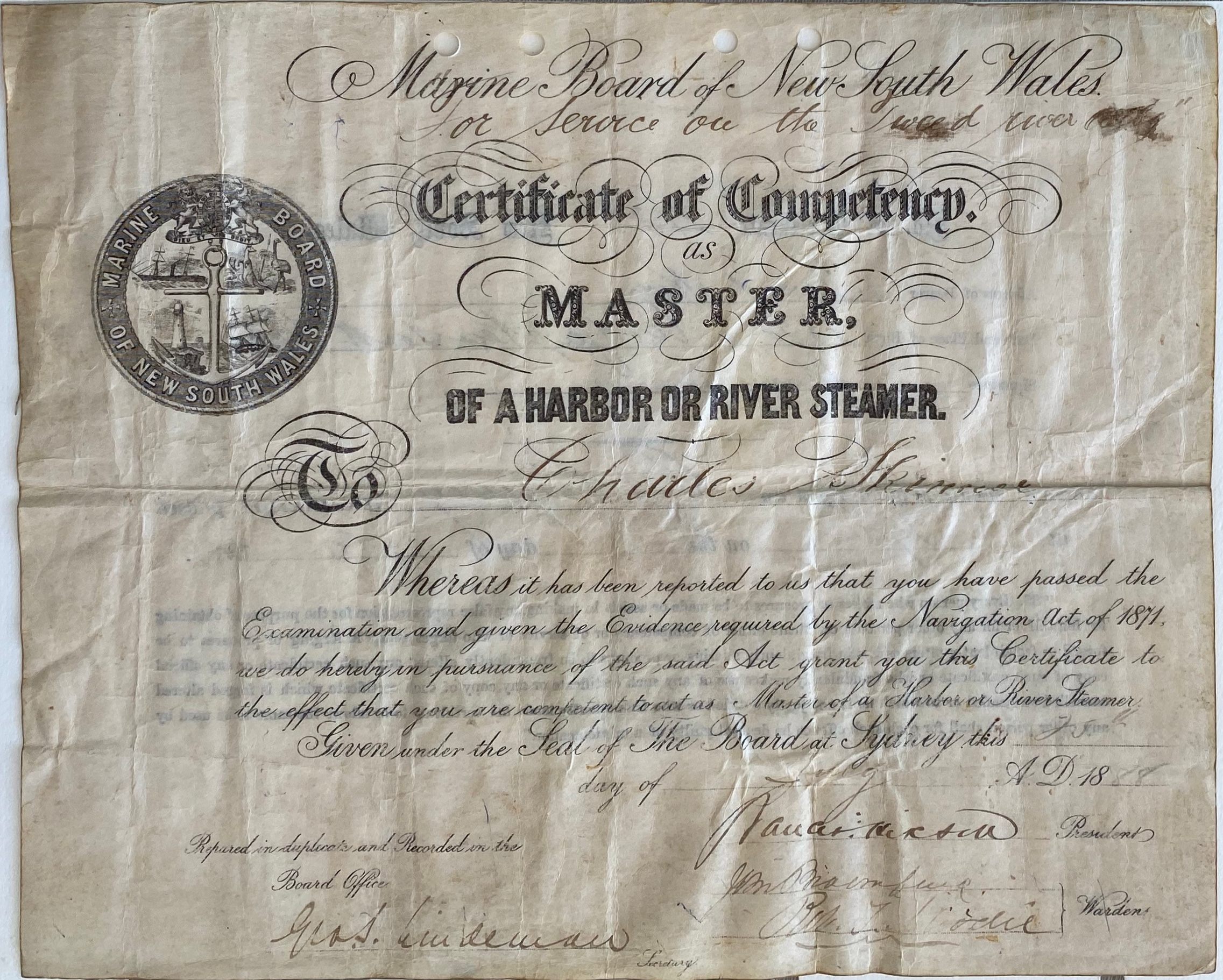
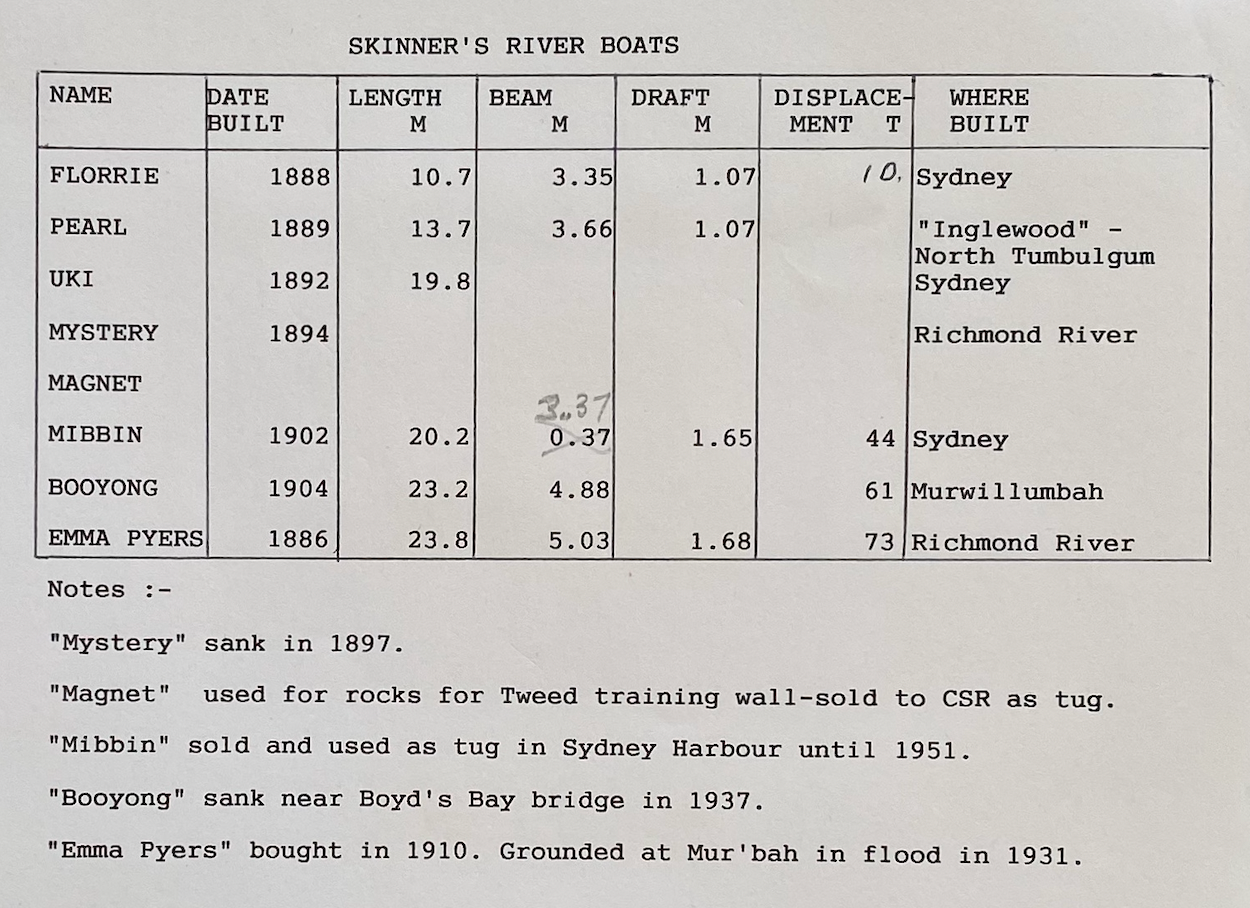
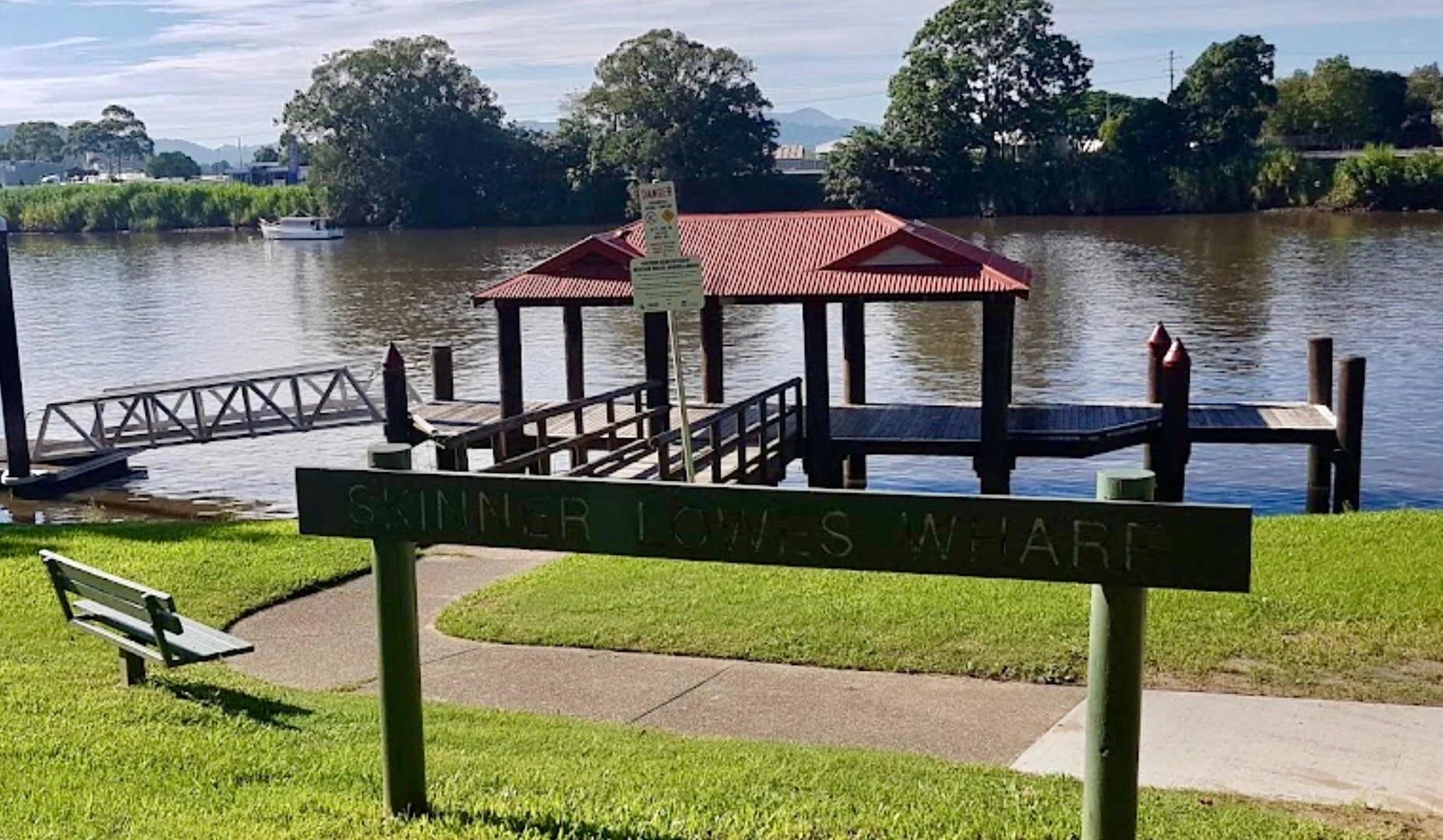
Growth with District
The history of Skinner, Lowes and Co. Ltd., cordial manufacturers and forwarding agents, Murwillumbah, is closely associated with that of the Tweed district. The firm was established in the days when the Tweed was young, and, as the district has flourished and expanded, so did the firm of Skinner, Lowes and Co. Ltd.
It was about the year 1880 when Brothers George and Charlie Skinner opened a small cordial factory at Tumbulgum, at that time the chief centreon the river. There were a number of hotels to be supplied between Tweed Heads and Byangum, and the industry and energy of the Skinner brothers is evidenced by the fact that all deliveries were made per medium of pulling boat.
In consequence of the growth of the business, the steamers "Pearl" and "Florrie" were purchased for delivery purposes, and it was soon evident to the Skinner brothers, that they might extend their operations to the carrying of passengers and freight with profitable results. The firm established the first link between the New South Wales and Queensland railheads and maintained it for many years. About the time the steamers were purchased, Murwillumbah, which had out grown Tumbulgum, was made the centre of the firm's activities. Eventually, Messrs. George and Charles Skinner retired from business, which was then carried on by their sons and Mr. F.Lowes, under the title of Skinner, Lowes,and Co, until 1920, when it became a limited liability company.
Increasing business resulted in the erection of the company's fine brick factory and offices at 2 Tumbulgum Road, opposite the wharves, where all its business was transacted. The factory was fitted with the most up-to-date machinery, and this, combined with the fact that only the purest ingredients were used, enabled the firm to manufacture, cordials and aerated waters of an exceptionally high standard. The various flavours were produced by use of pure juices from Australian fruits, including lemon, orange and passion fruit, thus the firm could lay claim to the manufacture of Australian goods. A distinct advance was made in the matter of distribution, for, instead of rowing boats, the company used three commodious steamers plying between Murwillumbah and Tweed Heads, and, in addition to delivering cordials, they carried passengers and freight. For town delivery, motor lorries were utilised as they became available.
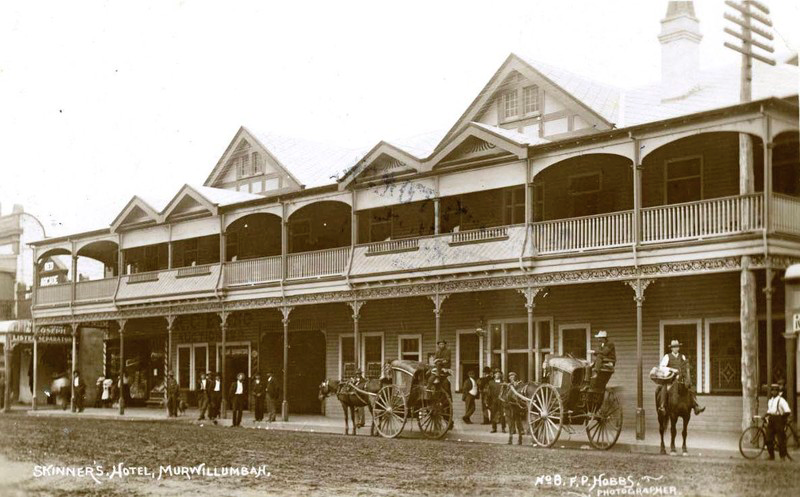
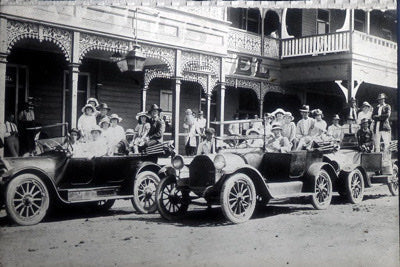
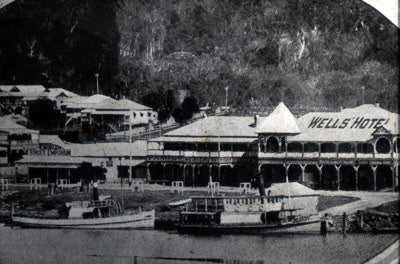
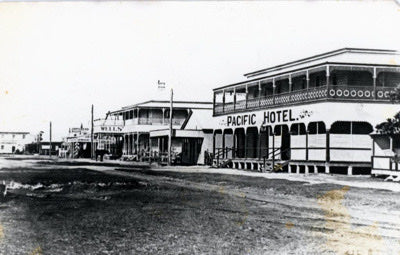
Skinner Brothers Beverages
Aerated Water and Cordial Manufacturers ability to produce pure and wholesome mineral waters was a boon to any new pioneering town. Skinner Bros located in Wharf Street, Murwillumbah, since 1880 had been supplying shows, hotels, clubs etc. with cordials which were praised for their refreshing qualities. Only the most healthy natural ingredients were used in their manufacture: essences and flavors used to produce drinks that would linger in one's memory. The satisfying taste of the Skinner brand Kola, Orange, Lime and Hop Beer you were all popular beverages. Manufactured with a special process where they mix and drew them off. Skinner and Lowes famous Lemonade, Dry Ginger Ale, Ginger Beer and Ginger Shandy were all particular favorites in all seasons. The management kept, the factory in a highly efficient state with the purchase and installation of the most up-to date machinery and appliances. Bottles were thoroughly sterilised, and passed on to the syruper, where they would receive the requisite amount of syrup to ensure a perfect drink, returning again of their own account to the conveyor and so to the carbonator, now receiving the charged soda. Mr. Les. Skinner was manager of this enterprising business. The firm's policy had always been to constantly keep abreast of the times by incorporating modern ideas which enable them to produce the perfect cordial. (Tuesday 5th September 1939 : Tweed Daily)
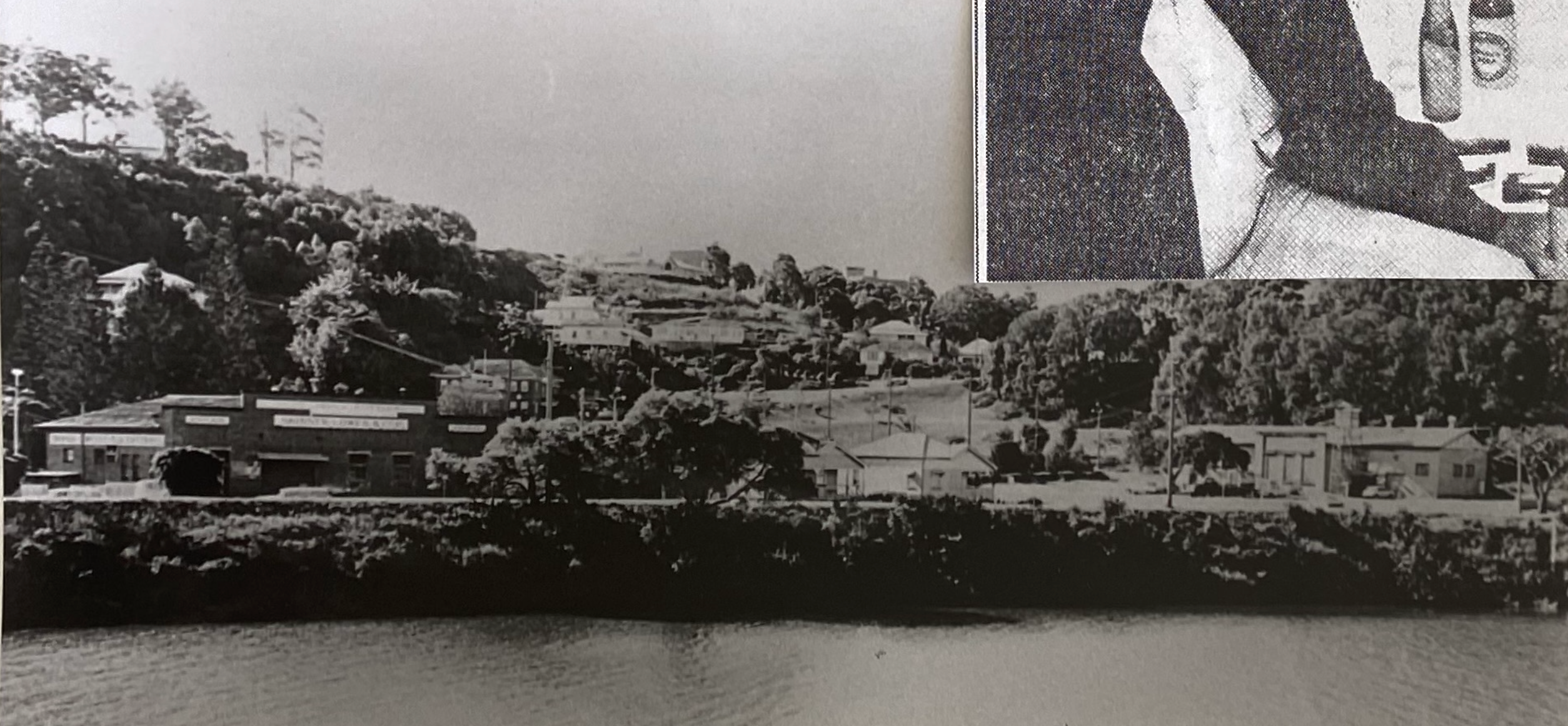
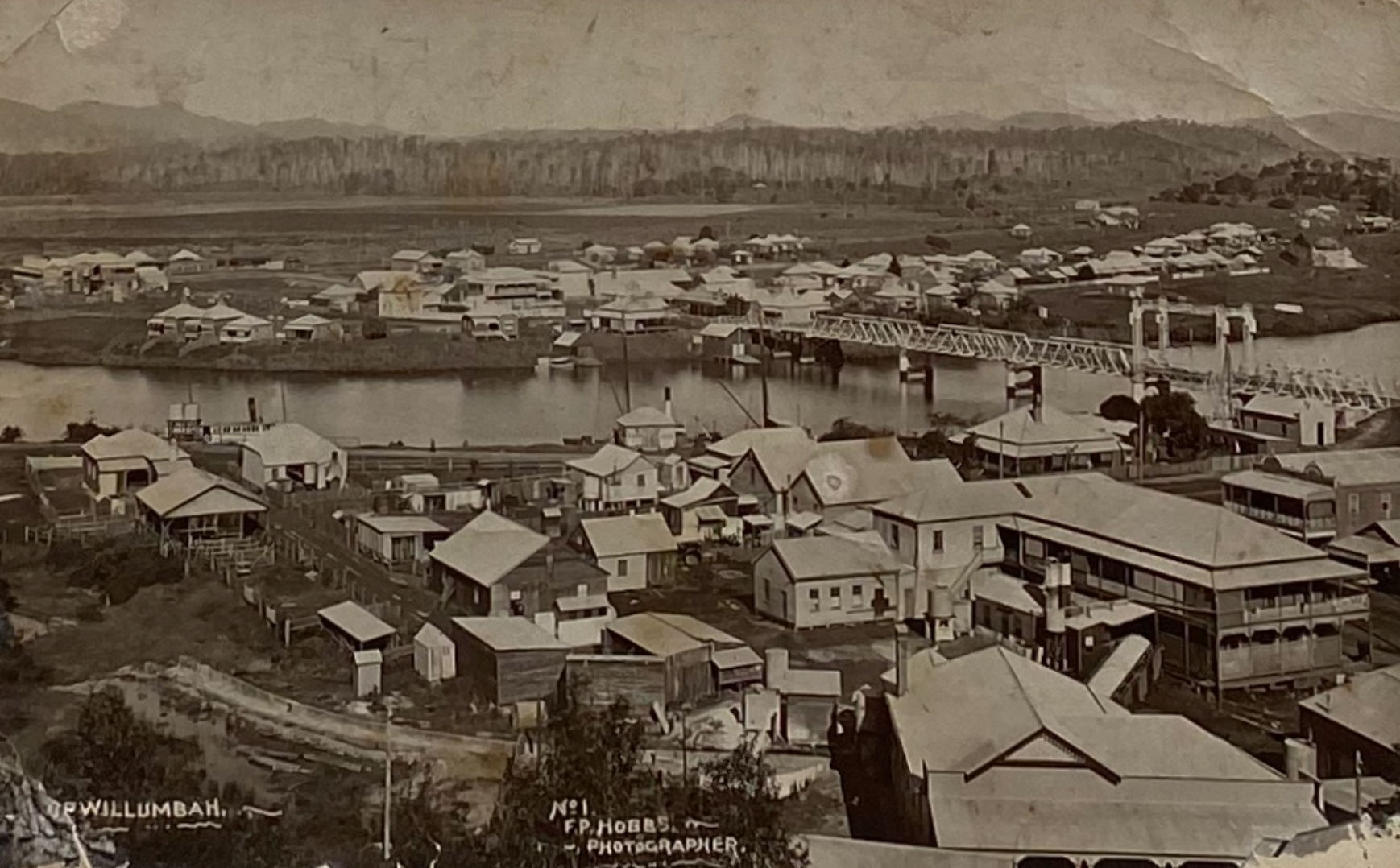
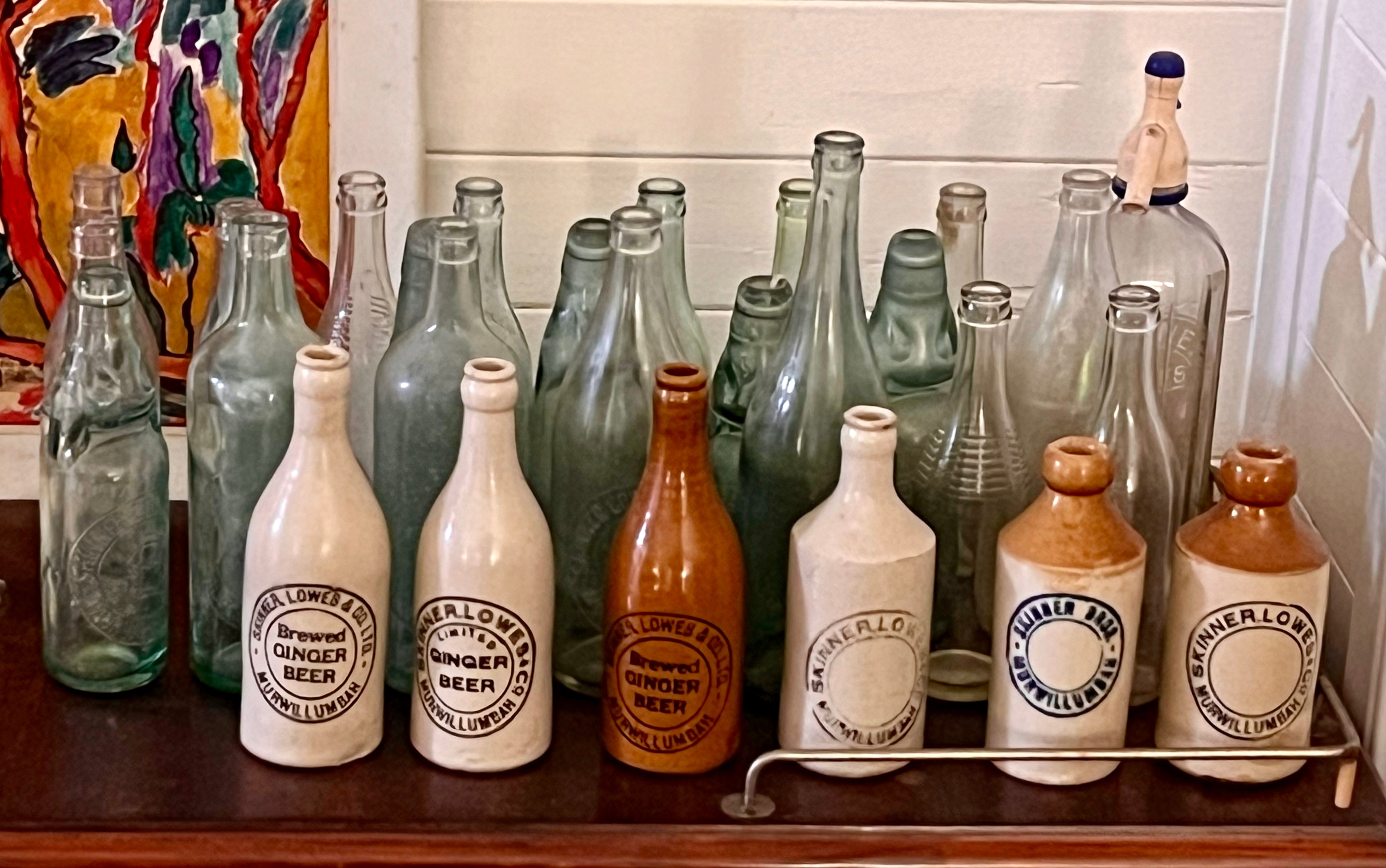
The Skinner Family: Pioneers of the Tweed Valley
The Skinner family’s legacy in the Tweed Valley is a testament to hard work, innovation, and adaptability. They arrived in the region during the mid-1800s, at a time when fortunes were being made in the cedar-getting industry. Henry Skinner, like his father before him, was a skilled sawyer, and it was timber that first brought him to the Tweed in 1863. He signed a contract with Samuel William Gray, a prominent figure in the area, to cut timber for shipbuilding. With his partner, William Davis, Henry established himself as one of the early cedar-getters in the region, navigating the challenges of this demanding work to meet the needs of the growing community.
Early Success in Timber and Land Ownership
The cedar business was labor-intensive and physically challenging, but the Skinners thrived, establishing a solid reputation for their reliability and resilience. They were quick to recognize the potential in land ownership as well. With new land allocations opening up, they purchased a block along the Rouse River, where they began cultivating sugar cane, a crop well-suited to the region’s fertile soil. The family’s innovative spirit shone through as they constructed one of the first horse-drawn sugar mills in the valley. This not only served their own needs but also those of other farmers in the area, further integrating the Skinners into the local economy and establishing them as essential contributors to the agricultural development of the Tweed Valley.
Expansion into the Cordial Business and River Transport
As the family’s success in sugar cane and timber grew, they began to diversify. One of Henry’s sons traveled to Casino to learn the art of cordial-making, bringing this knowledge back to Tumbulgum. The family launched a cordial factory, producing flavored drinks that quickly became popular among residents. Using rowboats, they distributed their cordials and other beverages along the river, reaching customers throughout the valley. This initiative was not only profitable but also demonstrated the Skinners’ adaptability and willingness to meet emerging demands within the community.
Their ventures expanded further when they won the contract for a mail run between Murwillumbah and Tweed Heads. The mail service quickly grew into a larger enterprise, and they soon added passenger services to their route, connecting communities and providing a crucial link for people and goods. The mail run ultimately led to the creation of a fleet of riverboats, which became the primary transportation service along the Tweed River. This fleet, including boats like the Emma Pyers, the Mebbin, and the Booyong, became a lifeline for many residents, facilitating trade, communication, and transportation in an era when road infrastructure was limited.
Navigating Change: The Great Depression and New Challenges
The Great Depression brought significant economic challenges, but the Skinner family’s resilience helped them weather the storm. During this period, they adapted their business strategies, diversified their offerings, and explored new markets outside the valley. This adaptability was crucial for their survival in a time when many businesses struggled to remain afloat.
However, the arrival of Coca-Cola in the post-Depression era posed new challenges for their cordial business. Coca-Cola’s strong brand and marketing prowess made it a formidable competitor, and the Skinners had to adjust to remain competitive. At the same time, the rise of motor vehicles began to reduce the reliance on river transport, leading to a gradual decline in the demand for their boat fleet. Recognizing this shift, the family began to pivot toward road transportation, adapting their logistics to fit the new reality of a motorized world.
A Lasting Legacy in the Tweed Valley
Despite the eventual closure of their cordial factory and the phasing out of the riverboat fleet, the Skinner family’s impact on the Tweed Valley remains undeniable. From their pioneering efforts in the cedar and sugar cane industries to their innovations in transport and beverage production, they played a foundational role in the economic development of the region. Their contributions helped shape the Tweed Valley into the thriving community it is today, and their story stands as a testament to the power of hard work, adaptability, and community-minded entrepreneurship.
